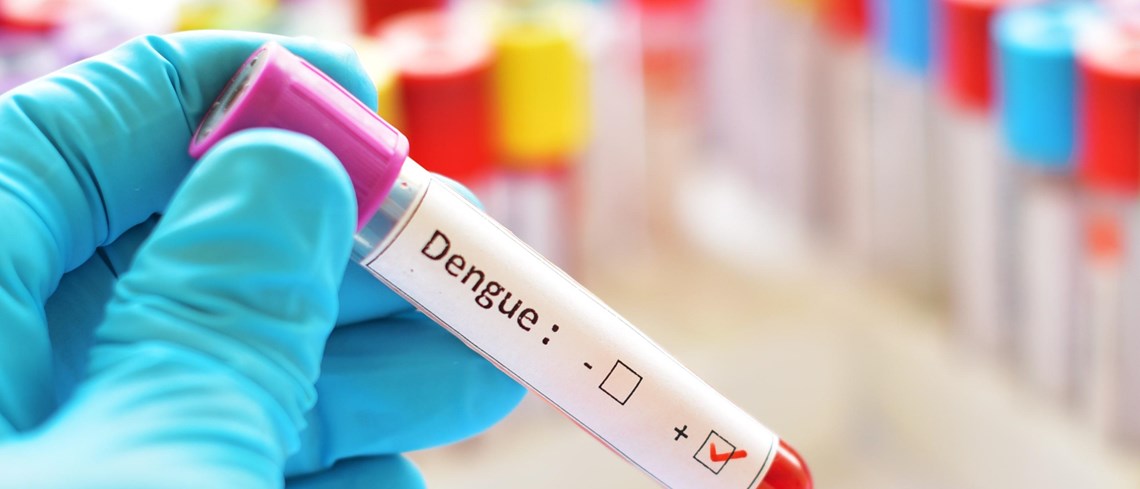
Everything You Need to Know About the Symptoms of Dengue
Symptoms of Dengue: Early Signs And Prevention
The word Dengue generates dreadful thoughts in our minds, and why not? The global occurrence of dengue has gone up dramatically, with about half of the world’s population at risk. The good news, however, is that although an estimated 100-400 million infections occur each year, over 80% are generally mild and asymptomatic1. So, before we press our panic buttons, let’s understand what dengue is, what are the common symptoms of dengue that people experience and how it can manifest in different ways depending on the severity of the infection.
Dengue Causes, Symptoms, Treatment & Prevention
Dengue is a viral disease that is transmitted through the bites of infected female mosquitoes, particularly the Aedes aegypti species. It is a significant public health problem in tropical and subtropical areas of the world, including parts of Asia, Africa, the Caribbean, and Central and South America. Below are the causes, transmission, and risk factors for dengue.
- Definition and Causes of Dengue:
Dengue is a viral illness caused by the Dengue virus. It belongs to the Flavivirus family – the virus has four distinct serotypes (DENV-1, DENV-2, DENV-3, and DENV-4) that can cause disease in humans. When an infected mosquito bites a human, the virus can enter the bloodstream and cause Dengue fever.
- Transmission of the Dengue Virus:
The Dengue virus is primarily transmitted through the bite of an infected Aedes mosquito. These mosquitoes typically bite during the daytime and are most active in the early morning and late afternoon. The virus cannot be transmitted directly from person to person.
- Risk factors for Dengue:
Some of the factors that increase the risk of contracting Dengue include living or travelling to areas where the disease is prevalent, having a weak immune system or if an individual has been previously infected with one of the Dengue virus serotypes. Mosquitoes that transmit the virus tend to breed in areas with standing water, such as flower pots, water coolers and gutters.
- Who is at risk for Dengue?
Anyone living or travelling to an area where Dengue is prevalent is at risk for the disease. This includes people of all ages, although severe dengue symptoms are more common in children and adults over 65. People with chronic diseases, such as diabetes, heart disease, or asthma, are also at an increased risk of developing severe symptoms of dengue fever.
Basic Symptoms of Dengue
Dengue signs and symptoms can range from mild to extreme, with severe cases leading to dengue hemorrhagic fever, which can be life-threatening. Below, some common symptoms of dengue have been discussed:
Beginning Symptoms of Dengue:
The early symptoms of Dengue can appear within 4-7 days after being bitten by an infected mosquito. These symptoms may include:
- High fever: A sudden high fever, usually above 101°F (38.3°C), is one of the most common early symptoms of dengue. This fever can last from 3-7 days.
- Severe headache: A severe headache is another common symptom of dengue fever. The headache is usually located behind the eyes and can be accompanied by eye pain.
- Joint and muscle pain: Dengue can cause extreme joint and muscle pain, which is also known as Dengue fever. This pain may last for several days.
- Nausea and vomiting: These are counted among the severe dengue symptoms and, in some cases, may require hospitalization.
- Swollen Lymph Nodes: Dengue can cause swelling of the lymph nodes, which can be very painful.
- Rash: A rash may appear on the skin within 2-5 days after the onset of the The rash usually starts on the arms and legs and spreads to the torso.
Later Symptoms of Dengue:
As the fever subsides, the following symptoms may appear:
- Severe Abdominal Pain: Dengue fever can cause severe abdominal pain, which may be mistaken for appendicitis or other abdominal conditions.
- Persistent Vomiting: Dengue fever can cause persistent vomiting, which can lead to dehydration and other complications.
- Bleeding From The Nose or Gums: In extreme cases, dengue can cause bleeding from the nose or gums.
- Blood In The Urine, Stool or Vomit: Dengue can cause bleeding in the digestive tract, leading to blood in the urine, stool or vomit.
- Fatigue: Dengue fever can cause extreme fatigue, which can last for weeks after the fever has subsided.
- Restlessness: In some cases, it causes restlessness and difficulty in sleeping, which can make recovery more difficult.
Seeking medical attention if you experience any of these symptoms is important. Prompt medical help can prevent complications and speed up recovery.
Diagnosis and Treatment of Dengue:
Early diagnosis and treatment of dengue fever are crucial for reducing the risk of severe complications. Here’s what you need to know about the diagnosis and treatment for dengue:
Diagnosis:
- Physical Exam: Doctors can diagnose dengue by performing a physical exam and evaluating the patient’s symptoms. Symptoms of dengue include fever, headache, muscle and joint pain, and rash.
- Blood Tests: Blood tests can detect and confirm the presence of the dengue virus in the blood. The most common blood test used to diagnose dengue fever symptoms is the NS1 antigen test.
Treatment:
- Rest and Fluids: The treatment for dengue is mainly supportive, and patients are advised to rest and drink plenty of fluids to avoid dehydration.
- Over-The-Counter Pain Relievers: Pain relievers like Paracetamol can help relieve fever and
- Hospitalization in Severe Cases: In severe cases, hospitalization may be necessary. Patients may require intravenous fluids to prevent dehydration and may need to be monitored for signs of bleeding.
- Prevention of Complications: It is crucial to prevent complications such as dengue hemorrhagic fever, which can be fatal. Closely monitoring blood pressure, fluid balance, and platelet counts is essential in severe cases.
While most people recover from dengue without much difficulty, some serious complications can occur, especially in severe cases. Here are some of the most common complications of dengue:
- Dengue Hemorrhagic Fever: This is a rare but potentially life-threatening complication of dengue. Symptoms may include severe abdominal pain, persistent vomiting, bleeding gums, and difficulty in breathing. Treatment may involve hospitalization, blood transfusions, and other supportive care.
- Dengue Shock Syndrome: This is a severe form of dengue fever that can lead to shock and organ failure. It occurs when the virus causes the blood vessels to become leaky, leading to a drop in blood pressure and shock. Symptoms may include severe abdominal pain, rapid heartbeat, and cold, clammy skin.
- Encephalitis: Encephalitis is a rare but serious complication of dengue that can cause inflammation of the brain. Symptoms may include headache, confusion, seizures, and coma.
If you or a loved one experience any of the symptoms mentioned above, seek medical help immediately. Early diagnosis and treatment can make a significant difference in the outcome of dengue fever.
Prevention Of Dengue
Preventing the spread of dengue is possible by implementing effective mosquito control measures. Following are some of the ways in which this can be achieved:
Mosquito Control
- Elimination Of Standing Water: Mosquitoes breed in stagnant water, so it’s essential to eliminate any sources of standing water around your home and its surroundings. This includes emptying containers like flower pots, bird baths, buckets, water coolers etc., If you find standing water anywhere, disinfect it with Dettol Disinfectant Liquid.
- Use Of Insecticides: Insecticides effectively kill adult mosquitoes and prevent their breeding. Mosquito coils, mosquito repellent creams, and aerosol sprays are all effective ways of keeping mosquitoes at bay.
- Window Screens: Using window screens is an effective way of preventing mosquitoes from entering your home.
- Mosquito Nets: Using mosquito nets over beds and sleeping areas can protect you from mosquito bites.
Other than the preventive measures for dengue mentioned above, here are three personal protection measures that you can take to safeguard yourself from dengue:
Personal Protection
- Use of Insect Repellent: Using mosquito repellent can be an effective way to prevent mosquito bites. Apply the insect repellent on your exposed skin, such as your arms, legs and neck. It is highly recommended to use repellents that contain DEET (N, N-Diethyl-meta-toluamide). These can give protection from mosquitoes for up to 10 hours. You can also use mosquito repellent sprays or vaporizers in your living space to keep mosquitoes away.
- Protective Clothing: Wear protective clothing like long-sleeved shirts, full-length pants and socks to cover your skin when you are outside. Use light-coloured clothes, as mosquitoes are more attracted to dark clothes.
- Staying Indoors During Peak Mosquito Hours: The Aedes mosquito is most active during the day, especially during the early morning and late afternoon. Stay indoors during these peak mosquito hours. If you need to go outside, use protective clothing and mosquito repellent to prevent mosquito bites.
Final Thoughts On Dengue Fever
In conclusion, dengue is a viral illness that can cause severe symptoms and even death in some cases. It is crucial to recognize the symptoms of dengue fever and seek medical attention immediately to receive proper treatment. The symptoms of dengue may include high fever, severe headache, muscle and joint pain, and rash. Dengue can lead to more severe complications, such as dengue hemorrhagic fever or dengue shock syndrome if left untreated.
Preventing dengue is the key to reducing the number of cases. Personal protection measures, such as insect repellents, wearing protective clothing, and staying indoors during peak hours, can help prevent mosquito bites and, thus, reduce the risk of dengue. In addition, proper sanitation and hygiene practices can also help reduce the breeding grounds for mosquitoes.
Overall, dengue significantly impacts public health in many tropical and subtropical regions of the world. It is important to take all necessary precautions to prevent dengue and seek medical attention if symptoms develop. Working together can combat dengue and other mosquito-borne illnesses and create a healthier world.


